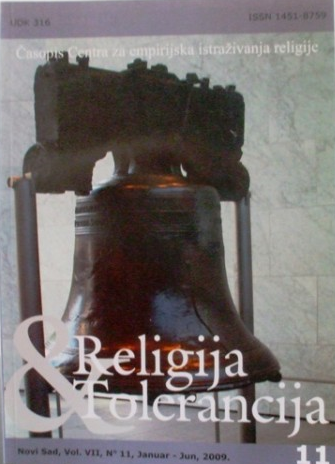THE CORRELATIONS OF RELIGIOUS AND NATIONAL-ETHNIC IDENTITY
THE CORRELATIONS OF RELIGIOUS AND NATIONAL-ETHNIC IDENTITY
Author(s): Sabina PstrockiSubject(s): Politics / Political Sciences, Theology and Religion, Sociology of Religion
Published by: Centar za empirijska istraživanja religije (CEIR)
Keywords: religious identity; national identity; Western-capitalism; liberal-democracy; etnically mixed individuals; imagined community; Eurocentrism; cultural disctinction; mainstream society
Summary/Abstract: This essay explains the connection that exists between conflict and religion, but also between nationalism and religious adherence. It points to the danger of misinterpretation of religious texts, that became very common phenomenon, and that often results in ethically unacceptable behaviour. The meaning of 'civilizational identity' as one contemporary and popular concept is explained, with special emphasis on what this identity means in Europe. The essay explores four basic phenomena related to national and civilizational identity (civilizational cores, the arguments in favour of being more or less contemporary, identities in European context and the role of ethnically mixed individuals). This text discusses how identities are shaped in modern states, and espacillay in Southermn and Eastern Europe, where war became a reality at the end of the last century, and tries to explain the phenomemnon of nationalism, also on the rise in the last few decades. Why religion and civililization are remarkably broader concepts than nation and ethnicity? How the imaginiging of these identities happens and what shapes it. How rise of novel and newspaper contributes to forming identity? These are just some of the issues treated in the essay. Distinction is made between patriots and national activists. The role of literacy, and languages is explored, and the impact of first tranlsations of Holy books. Specific relations to religion is described, like like the one attributed to England. Multicultural and international societies. There is a whole chapter on European nationalism and observations on nation as integrative and disintegrative fuel. Problems of creatiing nation-state in Europe are pointed. Europe's main achievement as international and multireligious society. Difference between nationalism and industrialisation and nationalism and nation-building. The fact is that `new identities`, naturally created shape European society and there is tendency from national and religious towards civilizational. Regional importance of these phenomena is illustrated in example of ex-Yugoslavia and war in Bosnia. Central hypothesis in this essay is that the relations between religion and nationality-state were very important at the beginning of the era after the fall of Berlin wall, during the rise of new democracies, and they are becoming even stronger, in a way that nations are merging into civilizations and civilizations identify with specific religions. European identities are created around very strong national member states but naturally and by means of intermarriage, the mixed identities are rising and shaping European future identity.
Journal: Religija i tolerancija
- Issue Year: 7/2009
- Issue No: 11
- Page Range: 57-72
- Page Count: 16
- Language: English

